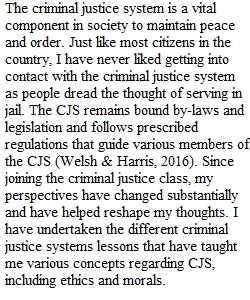


Q Students must demonstrate that they are able to reflect upon what they have learned throughout the entire course. This will be a good time to review Reflection Paper I to see how what you have learned, as well as your thoughts, opinions, and biases have changed throughout the course. Again, it will be important to integrate the knowledge that you have received from all reading assignments, lectures, videos, discussion boards, and writing assignments. Basically, students should be reflective in answering these questions: 1. What have you learned in the second part of the class? 2. What did you learn throughout the entire course? 3. Have your thoughts, opinions, pre-conceived notions, and/or biases about criminal justice policy and planning changed since the course began? In answering these questions, students will be expected to be reflective in giving their thoughts and opinions on what they are learning and what is important to them in learning. As was true with Reflection Paper I, some students may be learning more about working with a particular aspect of the administration of justice, which is perfectly okay. Make sure to focus on what you are learning and be reflective of what is significant about how you are learning in the course. Students should reflect on the material in an analytical and critical manner. As such, students should not summarize the material on a weekly basis, but rather reflect, integrate, dissect, critique, and analyze the knowledge received from a variety of sources. Also, this will be a good time for students to review their Reflection Paper I assignment to see how reflections are evolving throughout the course. Each reflection paper should cover information from a variety of sources and be reflective of how these sources of information fit together in your overall learning of the subject matter. In other words, these papers should not simply cover the readings, but must integrate, analyze, and provide critical reflection of the knowledge obtained from a variety of sources and/or courses. Students may select to do outside research in attempt to reflect, integrate, and understand the material, but this is not required. ** Reflection Paper II should focus on everything learned during the entire class with an emphasis placed on the material covered after Reflection Paper I was due. Minimum requirements: No citations are required. However, if you do use citations they must be in text and a separate reference page at the end of the paper must be in APA style. An acceptable range is between 2-4 pages double-spaced. A paper with fewer than two (2) full pages (1 inch margins on all sides) is not acceptable and will receive half-credit (50). A full page consists of text only; headers/footers, titles, name/date, and the like are NOT calculated in the full page requirement. Reflection papers that are not comprehensive in integrating all of the material and do not meet the minimum requirements will receive a 30 point deduction.As the semester progresses, the reflection papers will be expected to be more reflective, analytical, and insightful. All Reflection Papers must be submitted through Canvas. There are three Reflection Papers each worth 100 points for a total of 200 points. For assistance with APA style requirements, please go to the University of New Haven Library website at: http://www.newhaven.edu/library/Guides/StyleGuides/APA/. Points: 100 points each (200 points total) Due Date: Reflection Paper II is due on Saturday (3/14) by 11:59pm
View Related Questions